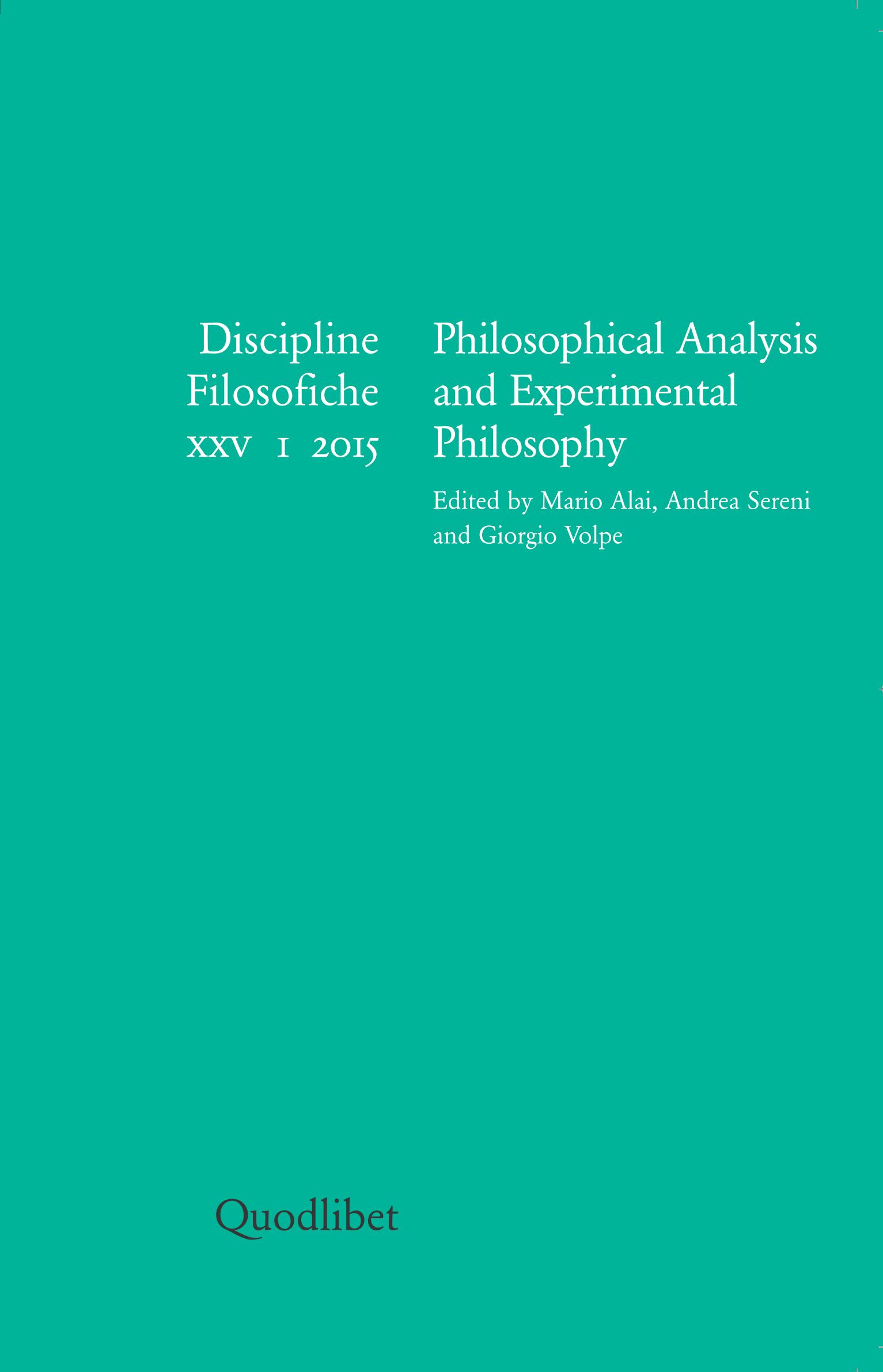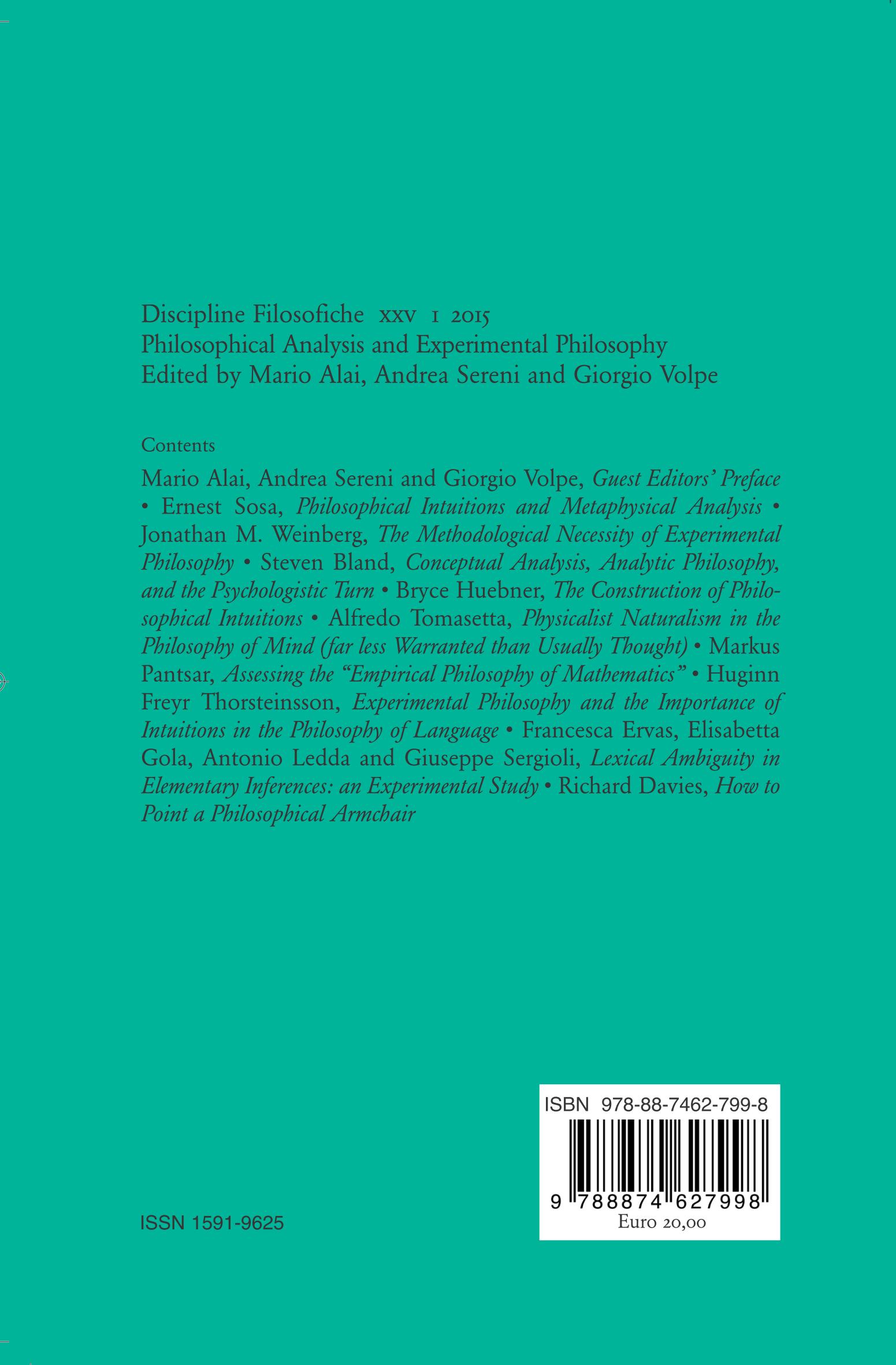 Over the last decades, a renewed interest for metaphilosophical issues has prompted many philosophers in the analytic tradition to raise questions on the epistemic status and the methodology of philosophical inquiry. Reflection has focused especially on the nature and reliability of intuitions, on the notion of a priori and on the plausibility of the idea that philosophical knowledge can be gained, as the phrase goes, “in the armchair”. This attitude stems from various sources, such as the cognitive turn that has shaped a consistent part of recent Anglophone philosophy, the revival of metaphysics encouraged by Kripke’s rehabilitation of de re necessity, and the formulation of new accounts of analyticity and a priori knowledge. In part, however, metaphilosophical issues have become so urgent for analytical philosophers as a result of the increasing attraction of so-called “experimental philosophy”.
Over the last decades, a renewed interest for metaphilosophical issues has prompted many philosophers in the analytic tradition to raise questions on the epistemic status and the methodology of philosophical inquiry. Reflection has focused especially on the nature and reliability of intuitions, on the notion of a priori and on the plausibility of the idea that philosophical knowledge can be gained, as the phrase goes, “in the armchair”. This attitude stems from various sources, such as the cognitive turn that has shaped a consistent part of recent Anglophone philosophy, the revival of metaphysics encouraged by Kripke’s rehabilitation of de re necessity, and the formulation of new accounts of analyticity and a priori knowledge. In part, however, metaphilosophical issues have become so urgent for analytical philosophers as a result of the increasing attraction of so-called “experimental philosophy”.
Upholders of experimental philosophy are driven by the idea that phi-losophical inquiry cannot afford to ignore the data gathered by empirical sciences. Considering the tendency to discount empirical results and to retreat into the domain of the a priori as a relatively recent development in philosophical methodology, they advocate a return to an earlier idea of philosophy, conceived as the study of the deepest questions raised by the human condition, a study necessarily open to the contributions of various empirical disciplines, such as psychology, cognitive sciences, social sciences and history.
Moreover, in the last fifteen years or so, practitioners of experimental philosophy have collected several sets of empirical data, from which they wish to draw significant consequences about the plausibility of various philosophical views concerning linguistic reference, the nature of knowledge, various issues in moral philosophy and several other subjects. Many ex-perimental philosophers believe that empirical research can enhance the reliability of philosophical inquiry by helping its practitioners to detect their own susceptibilities to bias and error. The aim of these experimental philosophers is to make a “positive” contribution to the practice of philosophical analysis.
Some experimental philosophers, however, are more radical: their “negative programme” is to show that the traditional way of doing philosophy, with its reliance on counterfactual reasoning and intuitions prompted by mental experiments, is intrinsically unreliable. As one would expect, this more radical position has sparked serious concern among practitioners of traditional philosophical analysis, who have reacted to its challenge in various ways: by questioning the soundness of the methodology employed by experimental philosophers in collecting their data, by denying that such empirical data can have any genuine bearing on philosophical research, or by refining their own view of the nature of the intuitions and/or methods employed in conceptual and/or philosophical analysis.
This issue of Discipline filosofiche includes two opening articles by two leading exponents of the opposite sides of the debate, Ernest Sosa and Jonathan Weinberg, and collects papers representing a wide range of approaches and positions on many of the issues raised by this clash of metaphilosophical paradigms.
Contents
(click on the titles to view the abstracts)
Mario Alai, Andrea Sereni and Giorgio Volpe, Guest Editors’ Preface
Ernest Sosa, Philosophical Intuitions and Metaphysical Analysis
Jonathan M. Weinberg, The Methodological Necessity of Experimental Philosophy
Steven Bland, Conceptual Analysis, Analytic Philosophy, and the Psychologistic Turn
Bryce Huebner, The Construction of Philosophical Intuitions
Alfredo Tomasetta, Physicalist Naturalism in the Philosophy of Mind (far less Warranted than Usually Thought)
Markus Pantsar, Assessing the “Empirical Philosophy of Mathematics”
Huginn Freyr Thorsteinsson, Experimental Philosophy and the Importance of Intuitions in the Philosophy of Language
Francesca Ervas, Elisabetta Gola, Antonio Ledda and Giuseppe Sergioli, Lexical Ambiguity in Elementary Inferences. An Experimental Study
Richard Davies, How to Point a Philosophical Armchair

 Italiano
Italiano


